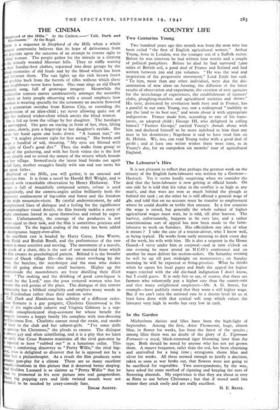The Labourer's Hire It is not pleasant to reflect that
perhaps the greatest work on the history of the English farm-labourer was written by a German- Hasbach. Yet it seems hardly surprising when we consider the deal that the farm-labourer is now getting at official hands. On one side he is told that his value in the conflict is as high as any man's, and that wars are won as much behind the plough as behind the tank ; on the other he is still offered a general wage of 48s. and told that on no account must he transfer to employment where he could double or treble that amount. In a few counties the wage is raised, but generally the whole subject of higher agricultural wages must wait, he is told, till after harvest. The harvest, unfortunately, happens to be very late, and a rather sanctimonious sort of appeal has now been made to the farm- labourer to work on Sundays. Has officialdom any idea of what it means ? I take the case of a tractor-driver, who I know well, as being typical. He works from early morning to dark every day of the week, his wife with him. He is also a sergeant in the Home Guard—I serve under him as corporal—and at nine o'clock on one evening he must attend an N.C.O.'s conference and on another he must deliver his section-orders. On Saturday evening he will be up till past midnight on manoeuvres ; on Sunday morning he will be expected at firing-practice. What he thinks when he opens his local paper and finds the appeal for higher wages rejected with the old die-hard indignation I don't know, but I could guess. It is only fair to say, of course, that there are farmers who voluntarily pay a higher rate than the county-rate and that many enlightened employers—Mr. A. G. Street, for example—have publicly stated that they want a still higher wage. But if we can't raise the national rate to a decent level let us at least have done with that cynical soft soap which values the labourer very high in works but very low in cash.


























 Previous page
Previous page